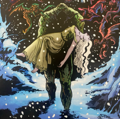Magnesium reviewed La Servante Ecarlate by Margaret Atwood
Not so speculative fiction
5 stars
I was warned this book is not a fun one. Indeed it is not.
You get to see the omnipresent fear and violence of a patriarchal surveillance state. You get to see how it got there, little by little, and how it got accepted. The disturbing part is that it is very much believable...
I hadn't seen since Orwell's "1984" the effect of a totalitarian system on an individual so well described, especially at an individual level. You get to see how a single mind resists or breaks when faced with such overwhelming brutal and oppressive environment.
It is definitely worth reading, especially when you keep in mind the fact that Atwood has been censored in several US states.
I was warned this book is not a fun one. Indeed it is not.
You get to see the omnipresent fear and violence of a patriarchal surveillance state. You get to see how it got there, little by little, and how it got accepted. The disturbing part is that it is very much believable...
I hadn't seen since Orwell's "1984" the effect of a totalitarian system on an individual so well described, especially at an individual level. You get to see how a single mind resists or breaks when faced with such overwhelming brutal and oppressive environment.
It is definitely worth reading, especially when you keep in mind the fact that Atwood has been censored in several US states.





